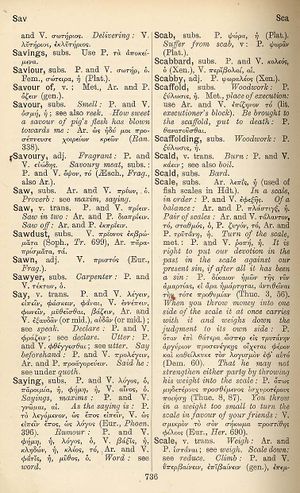say: Difference between revisions
From LSJ
Ὁ γράμματ' εἰδὼς καὶ περισσὸν νοῦν ἔχει → Qui litteras didicere, mentis plus habent → Wer schreiben kann, hat auch bedeutenden Verstand
(Woodhouse 4) |
(CSV5) |
||
| Line 1: | Line 1: | ||
{{ | {{Woodhouse1 | ||
| | |Text=[[File:woodhouse_736.jpg|thumb|link={{filepath:woodhouse_736.jpg}}]]'''v. trans.''' | ||
P. and V. [[λέγω|λέγειν]], εἰπεῖν, φάσκειν, [[φάναι]], V. ἐννέπειν, φωνεῖν, μυθεῖσθαι, βάζειν, Ar. and V. ἐξαυδᾶν (or mid.), αὐδᾶν (or mid.); see [[speak]]. | |||
<b class="b2">Declare</b>: P. and V. φράζειν; see [[declare]]. | |||
<b class="b2">Utter</b>: P. and V. φθέγγεσθαι; see [[utter]]. | |||
<b class="b2">Say beforehand</b>: P. and V. προλέγειν, Ar. and P. προαγορεύειν. | |||
<b class="b2">Said he</b>: see under [[quoth]]. | |||
}} | }} | ||
Revision as of 10:00, 21 July 2017
English > Greek (Woodhouse)
v. trans.
P. and V. λέγειν, εἰπεῖν, φάσκειν, φάναι, V. ἐννέπειν, φωνεῖν, μυθεῖσθαι, βάζειν, Ar. and V. ἐξαυδᾶν (or mid.), αὐδᾶν (or mid.); see speak.
Declare: P. and V. φράζειν; see declare.
Utter: P. and V. φθέγγεσθαι; see utter.
Say beforehand: P. and V. προλέγειν, Ar. and P. προαγορεύειν.
Said he: see under quoth.

